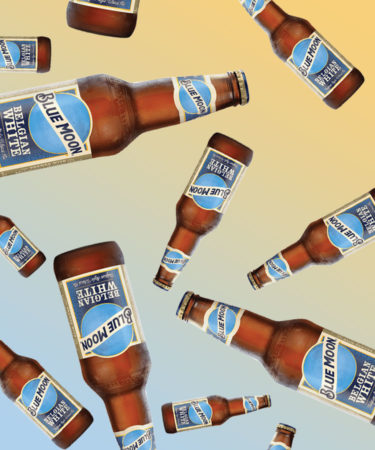Launched in Denver in 1995, Blue Moon’s wheat ale is now the top-selling beer in multiple states. It also inspires craft beer debates.
Here are 10 more things you should know about Blue Moon.
Blue Moon is not Belgian.
Blue Moon Belgian White is a Belgian-style wheat ale produced in the U.S. by MillerCoors, and in Canada by Molson Coors. This understandably confusing existence has led to lawsuits, trademark disputes, and a double identity (more on that later).
Neither is the orange slice.
Blue Moon’s signature orange wheel garnish? Not a Belgian tradition, either. The citrusy twist was little more than a marketing gimmick dreamed up by founder and creator Keith Villa, who thought it looked better than a lemon and paired well with the beer’s coriander and orange peel flavors.
Blue Moon started in a ballpark.
Keith Villa, then-brewmaster of the Sandlot Brewery in the basement of Denver’s Coors Field, created Blue Moon after receiving his Ph.D. in brewing from the University of Brussels. The beer was originally called Bellyslide Wit and was later changed to Blue Moon. According to brewery lore, the name was inspired by a fan who said, “A beer this good only comes around once in a blue moon.”
It took more than 20 years to find Blue Moon a home.
The Blue Moon label has long claimed its beers are produced by “Blue Moon Brewing Company.” Although the Sandlot Brewery was later renamed the “Blue Moon Brewery at the Sandlot,” Blue Moon was brewed at several other locations throughout the 1990s and 2000s. These include facilities in Utica, N.Y., from 1995 to 1997; Cincinnati from 1997 to 1999; Memphis from 1999 to 2001; and both Montreal, Canada and Golden, Colo., from 2003 to 2008. Since 2008, Blue Moon has been produced in Golden and Eden, N.C. In 2016, MillerCoors opened a Blue Moon brewpub in Denver’s RiNo art district.
Blue Moon has a secret Canadian identity.
In Canada, Blue Moon is called Belgian Moon. The reason is difficult to pin down. When VinePair investigated the double identity in 2018, we learned that a series of trademark issues complicated the beer’s Canadian release. However, a MillerCoors spokesperson told us otherwise, saying, “Blue Moon Belgian White is called Belgian Moon in Canada in order to differentiate ourselves from Labatt Blue beer.” We’ll leave it up to you. Nevertheless, Belgian Moon made its debut in Canadian beer and liquor stores in 2016.
Blue Moon has many phases, er, flavors.
In addition to the classic Blue Moon, the company’s range currently includes Mango Wheat, Iced Coffee Blonde, and the seasonal Harvest Pumpkin Wheat. Past releases have included Agave Blonde Ale, Blackberry Tart Ale, Raspberry Cream Ale, Peanut Butter Ale, and White IPA.
Blue Moon is the most popular beer in two states.
VinePair analyzed Nielsen CGA survey data to determine the most popular beer brand in every state. Blue Moon claimed the title for two states, Oregon and Maryland. Its popularity beat out one-state favorites Samuel Adams Seasonal (Massachusetts), Miller Lite (Pennsylvania), and New Glarus Spotted Cow Ale (Wisconsin’s amazing outlier). Other two-state favorites included Samuel Adams Boston Lager (Connecticut and Delaware), and Corona Extra (California and Washington State). Coors Light was the most popular in three states (Minnesota, Indiana, and, gasp!, New York). Winning the popularity contest in 22 states: Bud Light.
‘Craft’ is in the eye of the beer holder.
In 2018 and for several years prior, Nielsen and IRI named Blue Moon the top-selling craft beer in America. Its sales are no doubt the tops, but its Big Beer ownership means the Brewers Association and many craft beer fans definitely do not consider it “craft.”
Sometimes, the truth hurts.
At least two consumers have sued MillerCoors for Blue Moon’s misleading branding, namely the references to “craft” and “artfully crafted” on its labels. MillerCoors won both cases.
Blue Moon’s creator left for greener pastures.
In 2018, Villa resigned from his position at Molson Coors to launch Ceria Beverages, a line of cannabis-infused, non-alcoholic craft beers. He launched the company with his wife and Ceria CEO Jodi Villa. “I’m ready to introduce another high-impact brand to the industry again,” he said, adding, “Today, the opportunity and the demand are here, inviting Americans to enjoy a more social way of consuming cannabis – by drinking rather than by smoking it or through ingestion of edibles.”
